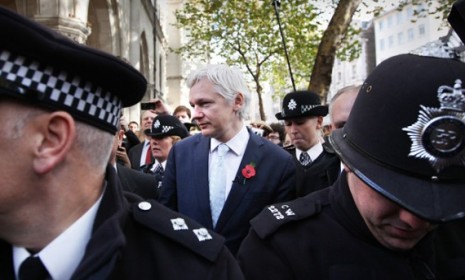Ecuador grants Julian Assange asylum: What will Britain do?
The British government has suggested it might take the drastic step of barging into Ecuador's London embassy to arrest the WikiLeaks leader — and Ecuador's furious

A free daily email with the biggest news stories of the day – and the best features from TheWeek.com
You are now subscribed
Your newsletter sign-up was successful
Defying British pressure, Ecuador on Thursday granted political asylum to WikiLeaks founder Julian Assange, who has been hiding in Ecuador's London embassy for two months to avoid extradition to Sweden for questioning on sexual assault charges. Britain says it won't allow Assange safe passage out of the country, and made a thinly veiled threat to revoke the Ecuadorean embassy's diplomatic status so the building would no longer be considered foreign territory, allowing British police to storm in and arrest Assange. Ecuador says it would consider such a move a "hostile and intolerable" violation of its sovereignty. Would the U.K. really take such drastic measures to nab Assange?
The U.K. will let Assange sweat where he is: The last thing the British government wants to do is send police storming into Ecuador's embassy, says Peter Beaumont at Britain's Guardian. That would set a dangerous "international precedent" that some other country could cite to justify invading one of the U.K.'s own embassies abroad. Besides, there's no need: The second Assange steps outside he'll be arrested. "And so Assange stays put for now."
"Julian Assange asylum row puts U.K. in catch-22 situation"
The Week
Escape your echo chamber. Get the facts behind the news, plus analysis from multiple perspectives.

Sign up for The Week's Free Newsletters
From our morning news briefing to a weekly Good News Newsletter, get the best of The Week delivered directly to your inbox.
From our morning news briefing to a weekly Good News Newsletter, get the best of The Week delivered directly to your inbox.
Eventually, Britain might have to charge in: Revoking the diplomatic status of Ecuador's embassy would indeed set "an appalling precedent," says Philip Dorling at The Sydney Morning Herald, "but that step may come." Assange and Ecuador aren't just defying London. They're insulting Sweden, and trying to make sure Assange will never face charges in the U.S. for releasing secret diplomatic cables. "The UK, Sweden and the US may all eventually decide enough is enough."
"The Latin Mouse that roared at the British bulldog"
The U.K. has no option but to wait: The British government doesn't really have much choice, Paul Whiteway, a former British diplomat, tells CNN. The 1987 law allowing the foreign secretary to "end the inviolability" of a foreign embassy is supposed to be "invoked in cases connected to public safety, national security, or town and country planning." Assange doesn't fit the bill. Still, neither side can back down now, so we're looking at a stand-off that could last years.
"What's next for Assange's extradition battle?"
A free daily email with the biggest news stories of the day – and the best features from TheWeek.com
-
 How the FCC’s ‘equal time’ rule works
How the FCC’s ‘equal time’ rule worksIn the Spotlight The law is at the heart of the Colbert-CBS conflict
-
 What is the endgame in the DHS shutdown?
What is the endgame in the DHS shutdown?Today’s Big Question Democrats want to rein in ICE’s immigration crackdown
-
 ‘Poor time management isn’t just an inconvenience’
‘Poor time management isn’t just an inconvenience’Instant Opinion Opinion, comment and editorials of the day
-
 The billionaires’ wealth tax: a catastrophe for California?
The billionaires’ wealth tax: a catastrophe for California?Talking Point Peter Thiel and Larry Page preparing to change state residency
-
 Bari Weiss’ ‘60 Minutes’ scandal is about more than one report
Bari Weiss’ ‘60 Minutes’ scandal is about more than one reportIN THE SPOTLIGHT By blocking an approved segment on a controversial prison holding US deportees in El Salvador, the editor-in-chief of CBS News has become the main story
-
 Has Zohran Mamdani shown the Democrats how to win again?
Has Zohran Mamdani shown the Democrats how to win again?Today’s Big Question New York City mayoral election touted as victory for left-wing populists but moderate centrist wins elsewhere present more complex path for Democratic Party
-
 Millions turn out for anti-Trump ‘No Kings’ rallies
Millions turn out for anti-Trump ‘No Kings’ ralliesSpeed Read An estimated 7 million people participated, 2 million more than at the first ‘No Kings’ protest in June
-
 Ghislaine Maxwell: angling for a Trump pardon
Ghislaine Maxwell: angling for a Trump pardonTalking Point Convicted sex trafficker's testimony could shed new light on president's links to Jeffrey Epstein
-
 The last words and final moments of 40 presidents
The last words and final moments of 40 presidentsThe Explainer Some are eloquent quotes worthy of the holders of the highest office in the nation, and others... aren't
-
 The JFK files: the truth at last?
The JFK files: the truth at last?In The Spotlight More than 64,000 previously classified documents relating the 1963 assassination of John F. Kennedy have been released by the Trump administration
-
 'Seriously, not literally': how should the world take Donald Trump?
'Seriously, not literally': how should the world take Donald Trump?Today's big question White House rhetoric and reality look likely to become increasingly blurred